As the sun set over the Fort Point district in Boston where I work, I talked to Lucy over speakerphone about her new memoir Something New: Tales From a Makeshift Bride, out from First Second this week (see our preview here). Please note that due to a recording failure, this was the second such interview we conducted which is referenced during the below conversation.
Comics Beat: While preparing for this interview, I went back and looked at the one we did two years ago when Relish came out and something that stood out to me is our conversation about honesty. It seems like with Something New we’re seeing a new iteration of honesty – the book opens with a discussion on how you’re an “expert on nothing”. What was the purpose of leading off with that?
Lucy Knisley: There’s so much media and literature flooding the market in terms of what a bride is supposed to do already. There’s books, there’s television shows, there’s a million magazines and blogs; this sort of “wedding media flood” and I found that very confusing and very intimidating. I also sort of disagreed with a lot of it, which is there to sell you something. So what I wanted to make clear from the beginning of this book was that this wasn’t an attempt to sell you on anything, even an idea of “the ideal wedding” or “how to do this”.
What I was presenting was my experiences in, an unbiased way, trying to traverse this whole world and a lot of that was getting through all of the media that saturates the bridal market without falling prey to all of them stupid, scared nonsense that they use to try and sell you things. I’m not a professional wedding planner, I’m not a person who knows the wedding industry that well other than to have just lived through it myself, so I wanted to make that clear from the beginning. This isn’t a “how to get married” or “how to bride” book.
CB: I find that representative of something I feel you’ve worked towards; even though weddings are a very common practice, you’ve managed to take your own unique interpretation and experience of that but the make the emotional context very universal.
LN: Oh good!
CB: It’s a great way to talk to an audience. When putting together this combination of critique of weddings and a discussion of your wedding, where does Something New be more for the audience than yourself?
LN: I think that’s sort of the difference between writing a diary or a journal comic and writing memoir or autobiographical work. When you set out to write a diary or journal comic or a travelogue, in a lot of cases you’re digesting the events for yourself in a way and that’s left for the reader to interpret. When you try to find a larger contextual meaning in these true stories, that’s when you start to keep the reader in mind and keep this idea of the reader identifying with your experiences in mind. That’s what I really try to do in my memoir work.
In a way, the travelogue work that I’ve done in the past (French Milk, Displacement, An Age of License) have been a little bit more for myself I suppose, to understand the events that are happening in my life as they’re happening. Whereas my work like Relish and Something New has been trying to understand it in a broader context and really keep the reader in mind which is why Relish especially has this message about food and self-nourishing aspect of cooking and eating and including the recipes – trying to bring the reader in to experience this along with me and that’s what I’m attempting to do with Something New as well, to sort of bring the reader in and say this is a very universal experience; making a change in your life by taking on a partner and this is how it can be less scary.
CB: Since this is your second such memoir, what kind of tricks or methods for recalling and recounting pertinent experiences have you figured out?
LN: Yeah, of definitely. That’s actually part of why I challenge myself to do the travelogue work in between my longer memoir work – it builds up this muscle memory of recognizing an event in your life and finding a broader, contextual meaning for the the event that is more relatable for an audience. I think that forcing yourself to work on the fly and digest events quickly is really important to this muscle memory, building up this ability to share your work and have it not just be regurgitated information and have it be understood in a broader context.
CB: We touched on it last time, but I enjoyed how you spoke about how you have to remind yourself to keep yourself inside the moment even if you recognize it as a moment you’d like to discuss or use.
LN: Right! There’s this authenticity you have to experience in that moment and I’ve struggled with this at the beginning of my career; the separation between the character that I’m writing and myself while remaining honest and telling a true story about something that really happened to me. When you go through life with a conscious awareness that you’re going to be writing about it later, it both takes something away from you and from the reader later on because you didn’t experience it fully. It’s something I think every autobiographical writer struggles with, trying to both create meaning from the events that happen in their life while simultaneously going through these events in an honest way.
CB: What are some of the methods you use to stay in the moment?
LN: This is where the travelogue work comes in a lot, I feel like when I’m making a travelogue and the work is getting made very immediately it’s a way of building up these memory muscles; and journaling, at the time, I’m trying to find the common thread to pull the story together. Later on when I’m working more memoir-style, I can draw on these threads, but part of it just developing a good recognition for these moments and this muscle memory as I said of being able to experience something and later on draw from the memory. This is also one of the reasons I got married, so there’d be another person there to remember things that I could quiz him on and draw from his own memories to write my book.
CB: Ah, the true reason revealed.
LN: [Laughs] It’s true.
CB: Something from last time, I recall that you mentioned that pictures are helpful.
LN: Yeah taking photos, especially for a visual learning like myself, is incredibly important and a wedding is naturally going to have tons and tons of pictures taken of it, so that was really helpful of course.
CB: On the note of pictures, something I am very fond of is the way you break down chapters in Something New. Each one begins with a collage, a photograph that encapsulates the upcoming chapter. What’s behind these photographic introductions?
LN: I love the juxtaposition of photographic evidence versus told stories, it’s something I’ve always been fascinated with. I’m one of those people who reads a memoir or an autobiographical book and I flip to the back repeatedly to look at the picture of the author to ground myself and this visual idea of them in the world, being a real person. It’s something I’ve been fascinated with since the beginning, in French Milk, you can see my use of photographs is present right from the start and I’ve utilized this technique again and again.
I love the idea that there’s one person telling the story, relating it totally from their perspective, not just in the telling but the showing through the art, but all of a sudden you turn the page and see photographic evidence butting up against this one person’s truth as more of a universal truth – it’s this important, jarring moment. It’s something I’ve recognized in a lot of non-fiction work, specifically Alison Bechdel’s Fun Home in which you’ll be paging through the book and you’ll see a photograph of her father and it’s this amazing moment where you are reminded of the reality of this person existing in life and how closely her own memory is tied to his appearance and how she draws him exactly as he looked and I can see so much more about this character through my own unbiased viewed of this photographic, which adds to the whole story. That’s something that I really love to be able to include in my own work; this bouncing back-and-forth from your viewpoint to my viewpoint.
CB: This juxtaposition isn’t something I had noticed until Something New but since our last chat, I went back and looked at other memoir comics I have and it’s not used excessively, but it’s not an uncommon thing and it makes a significant about of sense and works very well. It’s a good reminder of the reality when the work itself also lends itself to having a sense of drama.
LN: Right, it’s not something people always recognize when they’re reading true stories; that these are real people and real events that have occurred. It’s really nice to remind the reader again and again that I’m a real person and these things really happened and for people to come up against this idea when they’re reading along.
CB: Something I thought about since yesterday; you portray a lot of your friends and family and since Something New focused on such a major life event, it seems like most of the people attending would be aware that you are working on a book about the event. How did that shake out? Where there any moments where something happened and everyone involved knew it end up in the book?
LN: [Laughs] Probably, but I think they did a pretty good job of keeping it to themselves. I’m very respectful of my friends and family, typically asking permission to use them in my work and make sure to show them ahead of time before anything gets published. Yeah, I know that my mom was a little bit worried about her depictions before the book was finished because wedding planning is very fraught and mothers and daughters have a lot of complicated feelings for one another. My mom and I certainly fought more and had more complicated relationship stuff going on between the two of in the year before my wedding than any other time in our lives and I know that she was feeling a little nervous about her depictions once she found out that there’s going to be a book.
She wasn’t feeling totally confident about her own character but she’s likes it and I think she trusts me to tell the story fairly even if it is totally from my perspective and one of the things that I tried to do was to showcase her and myself as both being equally crazy and having our own mountains to die on about this whole process. I think that she’s very supportive and understanding of that sort of thing. Also, of course my husband who lent this very important event in his life to his wife’s career was also very understanding about the way thay I was going to tell the story and depict him. Perhaps people are nicer to me than I merit but I’m not gonna think about that too hard!
CB: It’s an interesting measure of trust that you’re working with; not only are you working with the trust that your family and friends have in you, but also the trust that your audience puts in you to read a genuine thing. I’d wager that balance is hard to strike.
LN: Yeah, for a lot of people it’s a lot less real until there’s actually a book. I think that people don’t really fully grasp that the majority of writing a book is actually experiencing the events and thinking about it. You know, I have funny uncles who tell me that they have great ideas for a comic that never, ever sees the light of day, ever. I think that people understand that when I set out to write a story about something that happened to me it’s really just a story about me and my internal world than it is about the people around me or what they say or do. As much as everybody is self-obsessed, so am I and they know that it’s gonna be mostly a story about me.
CB: That’s what we’re here for.
LN: Yeah!
CB: Something we get to touch on twice, and it’s definitely shifting gears, is how Something New features on my favorite painters, Marc Rothko. If you wouldn’t mind repeating your history with Rothko’s work, I’d love to hear it again.
LN: Sure! So I first came to the awareness of Mark Rothko in my junior year of high school when I had started going to arts magnet school where you choose a “major” and spend an entire day immersed in whatever subject you choose, which is great. I was involved with art at the time and I had this great teacher. A little background of how I ended up at this school: I started out at three different other high schools before ending up at this one, which is the subject of one of my upcoming graphic novels, New Kid which I’ve been working on for a long time. It’s my homage to the importance of arts education and the way it saves kids like myself who are classified as learning disabled or troublemakers or problem children just because we’re artists and learn differently; that’s not something every educator knows how to teach to.
I bounced from school to school before I wound up at the arts school where suddenly we were in this environment where we were taken down to to New York City by train and the teacher would throw every kid onto Metro North and take us down for the whole day to see museums and galleries to really experience art as a living, breathing thing and a career that people were pursuing and living in at the time instead of pictures in a history book or a technique we were studying in a classroom. This was a total eye-opener for me, really changing my perspective on what it means to be an artist – like that it can actually be done to begin with. I remember that we got to see Rothko paintings in real life, probably at The Whitney or maybe MoMA, and Rothko’s one of those painters that when when you see them in person you have a very visceral reaction that’s totally different from how you would experience it in a book. I really credit this art teacher and this art program for introducing kids to art in such a meaningful way.
Rothko has been especially interesting to me because he’s incredible erudite and has written wonderful things about his process. He’s one of these painters that does such minimalist work essentially, yet it’s so complex and beautiful and has this great impact on the viewer. One of the things that he’s written about is this idea of the modern, minimalist artist attempting to recreate what a child instinctively does with their art; very expressive and instinctive way of making an image. I love the idea that an adult artist, a modern artist would be trying to recapture the idea of what a child does instinctively. I think that really extends to comics. It’s something I’ve thought about in my own work and in the work of artists that I admire; it’s this really instinctive story-telling way that we’ve, as a human race, have been telling through cave paintings. As early as mark-making existed, we’ve telling stories through the use of pictures in a row. It’s this attempt to capture this instinctive way of storytelling we’ve done since we were kids, like simple stories about getting in a rocket ship and going to the moon to see aliens; that’s comics storytelling at its most basic, effortless form. I love that it’s this universal storytelling method that everybody’s trying to recapture.

CB: I agreed with you before and I agree with you again. It’s a perspective I hadn’t considered as a person who deeply enjoys Rothko’s paintings. Seeing his work in person was absolutely an epiphany, it’s meaning to hear someone else’s version of that.
So, coming up on the end, Something New should have been out for a couple days at the posting of this interview. Marriage was the last subject and now the next life step for you is impending.
LN: [Laughs] Yes, hopefully sooner rather than later.
CB: So the next book, just announced this week, will be on your experiences with pregnancy?
LN: Yes. Much in the way that I was thrust into the wedding planning world and found it very confusing and unexpected, this is a whole new confusing and unexpected, insane process. There’s a lot of similarities like everyone’s trying to sell you something by freaking you out, there are a lot of identity shifts that happen, of course. I’m really interested in pursuing this thing I started doing with Something New where it was more researched. I took the idea of marriage and really wanted to understand what it meant to me personally and so I looked to history, culture, and society trying to explore what the wedding ceremony meant in a larger context, which is why there are inclusions and explanations of traditions and celebrations.
So for this next book, I’m going to be talking a lot about what I learned over the course of being pregnant and trying to be a parent and that’s going to be the focus of a lot of really strange stories I think and what we don’t pick up in traditional reproductive education and add onto what the bare bones education we get in middle and high school. I want to touch on how little is included in those programs; everybody who eventually has to make the choice about becoming a parent or not, about contraception or sexual health – all these important life choices – is only armed with the very bare minimum. I wanted to make a book that both talks about my own experience in this and talks about some of the things that I’ve learned that I think are really vital and important for people to understand when making these choices.
CB: First Second seems to be a good home for that with this and Maris Wick’s Human Body Theater.
LN: Yeah, I love that book so much! Maris has such a stronger scientific perspective that I do, everything I’m talking about comes from personal experiences. I thought Human Body Theater was brilliant.
CB: So you’ve included your friends, your family, your husband John, and others in your works. Now that this book is about pregnancy, what kind of thought have you given to discussing this soon-to-be small human’s life and their development in this book. There’s an interesting narrative and body autonomy discussion there.
LN: Definitely and the idea of who knowns these stories is something that I think I get better at every year, being sure to tell my story and not steal someone else’s. It is something that I’ve thought about a lot after becoming pregnant; how the autonomy of this individual makes them unable to choose until they’re verbal, to choose what is considered fair game for writing. I’m going to have to make that choice for a while and this is something I thought about when I used to read James Kochalka’s work American Elf and when he wrote The Cute Manifesto which is about having his first son and how these characters would feature prominently in his diary comics in a very revealing way, often. As I discussed earlier, journal or diary comics tend to be regurgitated information rather than placed in context so a lot of it was unfiltered events that happened with these kids.
I remember when he chose to stop making American Elf, it was partly because he felt that his sons had reached an age where their personal autonomy was for their own choices to be telling these stories or not and he felt like he wanted to move in a fictional direction and allow himself and his sons some privacy. I thought that was so interesting that he was making that choice after decades of doing this comic – to suddenly say “these aren’t my stories anymore”.
One of the things I’ve heard about parenthood is that you cease be the main character in your own life, your sort of a supporting character and that’s something that really resonated with me as someone who is the main character not only of my own life but the books that I’ve created for my career. To suddenly find my identity in such a shift where I’m not the main character anymore is gonna be a major upheaval to how I tell stories and work. I’ve been contemplating more fiction and drawing on my past a little bit more, I think this will profoundly change the way that my voice is represented in my work.
CB: That change is going to be very interesting to witness as a reader of your work, that’s for certain. One last, little question: will this book have recipes?
LN: [Laughs] The book on pregnancy? Um, well there’s one pretty major recipe that goes into making a pregnancy but I think that’s pretty understood already. But yeah, there’s definitely going to be food elements to it. Food has been the common theme in a lot of my work, there’s definitely recipes and food references in Something New and in French Milk and obviously Relish. Yeah I think food’s going to be a major contributor to this because for the first time in my life I’ve found myself unable to eat for large periods of time; just too sick to eat or unable to stomach the thought of food.
I had to re-introduce myself to food in a profound way because I’ve always been a garbage disposal, I’ll eat anything, I love eating and it’s so important to me. To suddenly be unable to eat was a major problem for me. So much about pregnancy is about nourishing your body and nourishing yourself which I thought would come really naturally to me and then I was too sick to eat for six weeks, so I had to find my way around that. The whole pregnancy food-craving thing is very interesting to me, what you’re supposed to and not supposed to eat. There’s all these traditions of what you’re supposed to and not supposed to eat that’ll harm you or the baby; it’s all about how your body is essentially not your own anymore. It’s really changed my relationship to how I eat and what I put in my body.
CB: Thank you so much Lucy, that was the last of my questions. I appreciate your taking the time to doing this again.
LN: Yeah, my pleasure Zach!
Lucy Knisley lives with her husband John in Chicago and makes travelogues and memoirs based off her own life. Her newest book Something New is out this week, available wherever books and comics are sold. You can find more about Lucy’s work here.



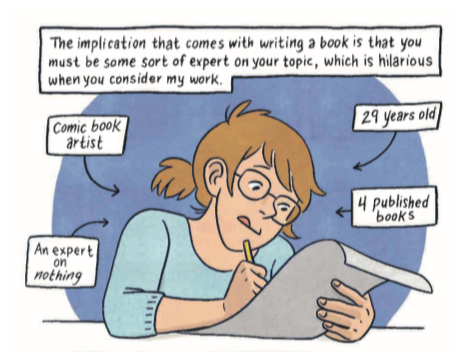
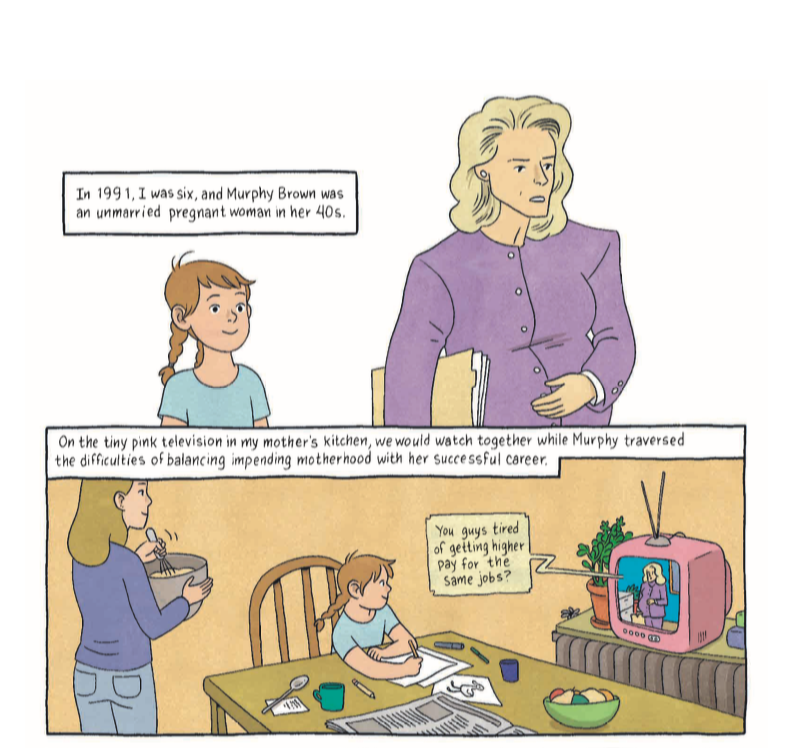
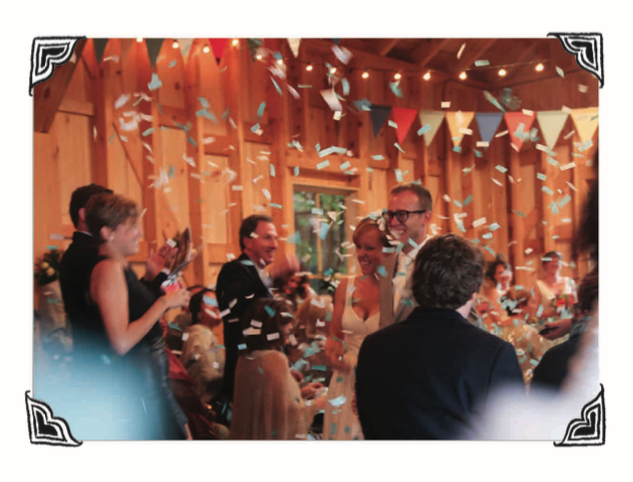
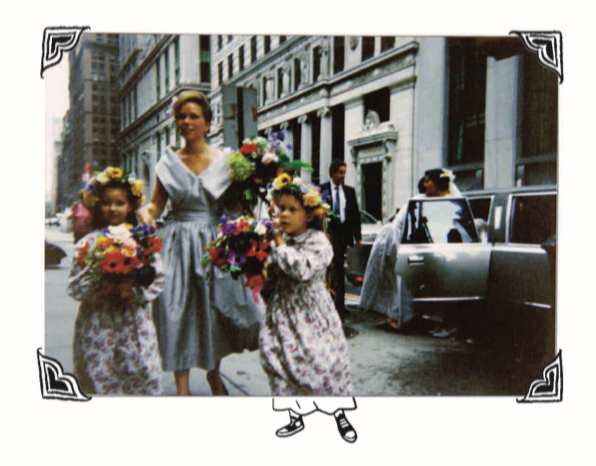
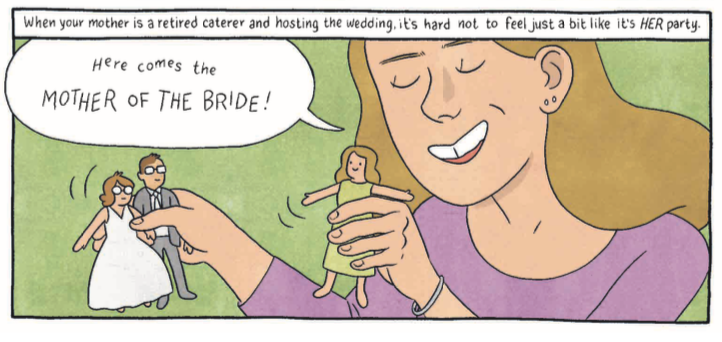
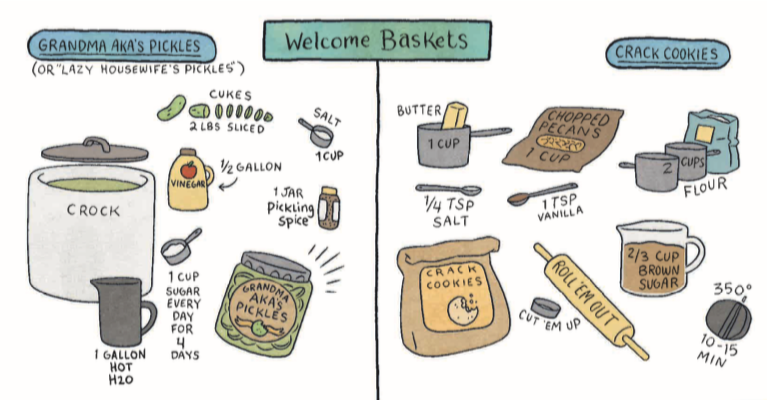
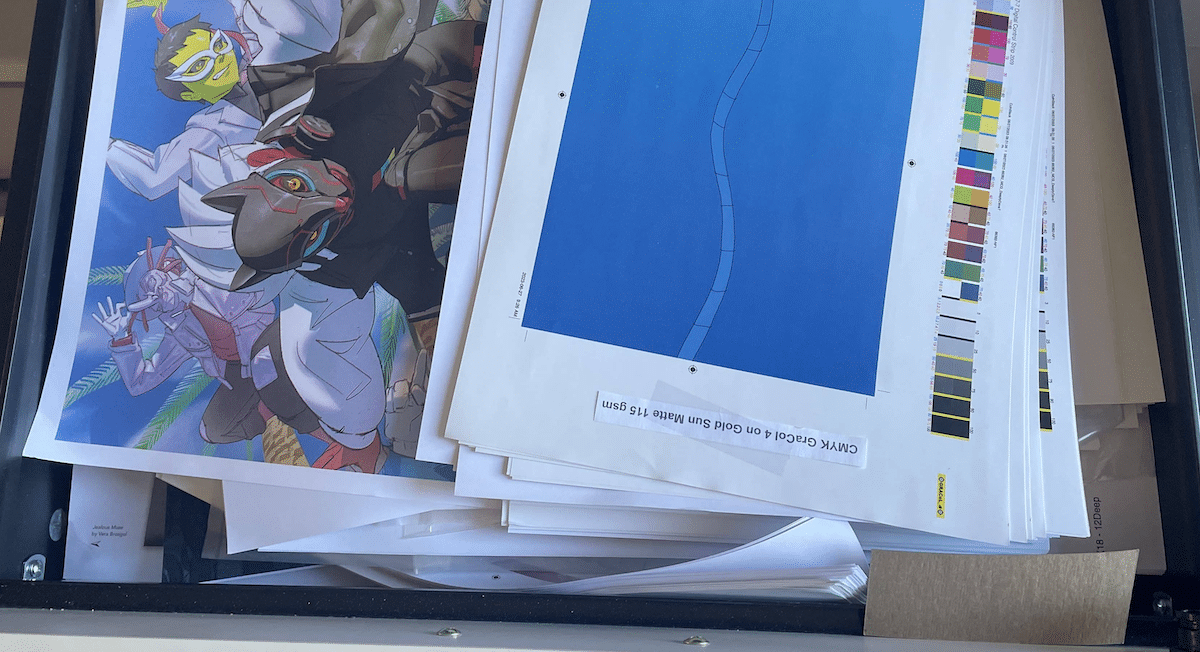
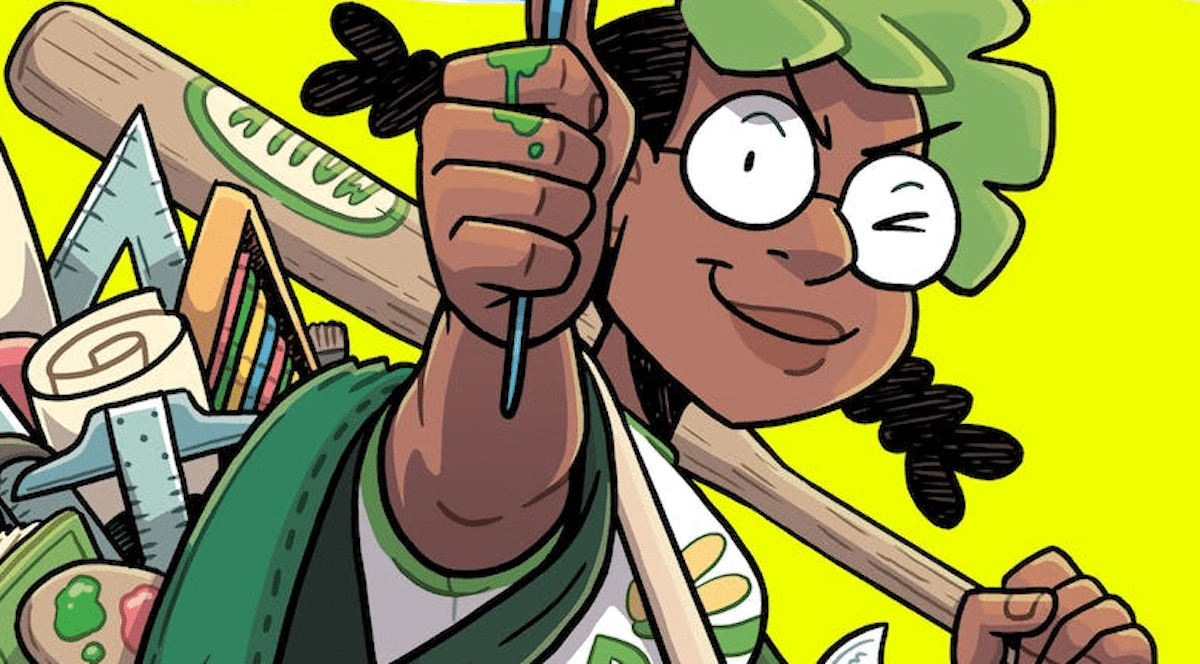
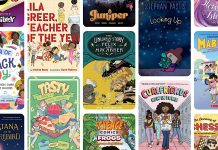


Wow, that was a great interview with Lucy. Authentic and heartwarming. Enjoyed reading it.
Comments are closed.